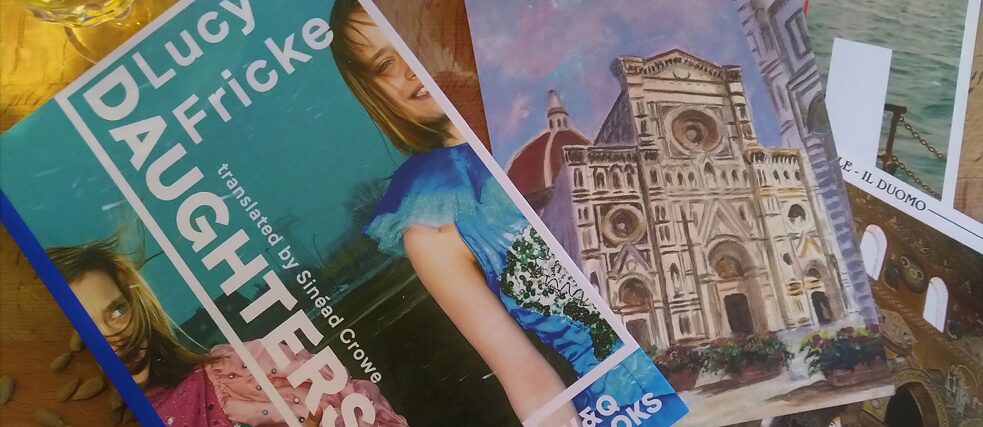February 2021
Lucy Fricke: Daughters

I avoided Fleabag when it first came out. I’ve never been good with fremdschämen, and the cringe moments in the trailer were enough to put me off. A couple of years later though, me and my TV license were the only means by which my Ireland-based sister could watch the second season. Which was fitting, because it was the sisters’ complex, intimate relationship which made me fall in love with the show. For me, season 2 of Fleabag was never about Hot Priest. My life’s built upon these weird, deep, amazing relationships with women – my sister, friends, colleagues – and yet I so rarely see these bonds celebrated in books and TV. Watching Fleabag felt like a moment of being seen.
And this was exactly why I was excited to read Lucy Fricke’s Daughters, translated with verve and humour by Sinéad Crowe. I read the first pages of the novel with a dizzy kind of exhilaration, wanting to send my best friend voice notes with quotes from every other page. The friendship in Daughters was achingly familiar: a friendship where we’ll fly across a continent because of the breaking point in someone’s voice, where the tiniest things can make us laugh until we cry.
Daughters starts when Betty’s close friend, Martha, asks for the most unexpected of favours – to help her drive her father to a clinic in Switzerland, where he plans to die. It’s the start of a madcap road trip across Europe:
«‘So what are we going for here?’ I asked. ‘Thelma and Louise?’
‘They were young, sexy and downtrodden,’ Martha said. ‘Look at us, we’re not even downtrodden.’
I tried again. ‘Why We Took The Car?’
‘They were teenage boys. We’re premenopausal women. I don't quite see the comparison.’»
Like Fleabag, Daughters deals with tough issues – illness, grief, depression – but does so with warmth and humour. Not the kind of humour which makes light of topics, but the kind we find ourselves adopting when in our darkest places – a sharp black humour which in the right (or wrong) moment can have you laughing hysterically or grinning wryly: “Just as I was hanging up, a pigeon shat on my head. I’d learnt by now that this wasn’t a good omen.”
I’m watching my wordcount creep up at the bottom of the screen, and I’ve not even delved into the book’s interrogation of Betty and Martha’s relationships with their parents, or the turn the story takes when the mafia gets involved, or Sinéad Crowe’s remarkable translation of the voices and cultural markers in the novel. But to be fair to Daughters, perhaps I should end with a disclaimer: Fleabag has sometimes been dismissed as just showing well-off people behaving badly. The characters in Daughters come from quite a different milieu – and while Betty and Martha have systematically severed themselves from their backgrounds, as Betty says, “you never escape your parents’ poverty, the smell sticks to you.” As to behaving badly: admittedly, getting drunk and trying to dig up her stepfather’s coffin might not be Betty’s finest moment. But at the end of it all, it’s a book about trundling on even when we just want everything to stop and about the lengths we go for the people we love.
About the author
Annie Rutherford is an incorrigible bookworm and Jill of all (word-based) trades. She is the programme co-ordinator at StAnza (Scotland’s international poetry festival), a German-English literary translator, and runs Lighthouse Bookshop’s Women in Translation book group, among other things. She has been known to read while cycling (she does not recommend it), and can spot a misplaced apostrophe at a distance of fifty yards.Borrow the original German title digitally via the eLibrary.
Reserve your copy in our library in London.
Find out more about the blog.